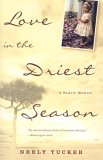Summary | Excerpt | Reading Guide | Reviews | Beyond the Book | Readalikes | Genres & Themes | Author Bio

Critics' Opinion:
Readers' Opinion:
First Published:
Feb 2004, 256 pages
Paperback:
Apr 2005, 288 pages
 Book Reviewed by:
Book Reviewed by:
BookBrowse Review Team
Buy This Book
Late at night on our small farm, I would curl beneath my sheets to listen to the train whistle blow for the clearing. I would sneak outside and watch it pass in front of our house in the moonlight. I stood in the yard, dew soaking my feet, and looked up past the oaks and pines to the stars above, feeling the earth rumble with the train's passing. I loved the place at such moments, I truly did. The sway of the trees and the whisper of the wind created a language all their own, and the night seemed warm and beautiful and secret.
On the long summer days and endless evenings, on rainy winter afternoons, with nowhere to go and not much to do, I began to lose myself in books and stories, imagining a world far from our sleepy pastures. I would start turning the pages and our house would fade away, replaced by another world that came from nowhere. Before I was thirteen, I read Treasure Island and Huck Finn and all of the Hardy Boys books and the Old Testament (when I was bored in church, which little boys often are) and Lord of the Rings and things that were way over my head, including Ernest Hemingway and Papillon, the memoirs of Henri Charriere, a French inmate who escaped from Devil's Island.
Those worlds seemed as real and important as anything going on in our little town--and a lot more exciting. I longed not just to watch the train go by our house, but to catch an armload of the next freight train running and ride it out of there, traveling to some of the places I read about. Then I would go sit on the railroad tracks and wonder what the real fairy tale was. For at least 150 years, as far back as anyone knew, everyone in my family had been a farmer in rural Mississippi.
But an era was coming to an end, and even the Magnolia State's "closed society," as one landmark book described it, was finally opening itself to the larger world. As the calendar pages fell and the years turned into the late 1970s, the Deep South's more vicious forms of racism began to ebb. The racial confrontations that roiled the country moved to the urban North. With the civil rights crusades fading into memory, with southern apartheid at least officially dismantled, small-town black and white teenagers in Mississippi began to try something none of our ancestors had--to grow up together. It was painful, it was odd, and sometimes it was surreal.
The most bizarre example of the latter could be found on the college football field, the Deep South's Saturday afternoon altar. In the 1970s, the University of Mississippi's football team was integrated, but the school still proudly went by the nickname of "Ole Miss" (the phrase slaves used for the plantation owner's wife in the antebellum days--as opposed to his daughter, who would be the "young miss"). The school's teams were called the Rebels, a reference to Confederate soldiers. That moniker, selected in the 1930s, came into play when the student body's other popular choice of the era, the Ole Massas (as in the slaves' name for the plantation owner), proved to be something of a tongue twister: the Ole Miss Ole Massas.
Nearly half a century later, a football game in Oxford looked like this: A black descendant of slaves with "Ole Miss" written on his helmet would score a touchdown for the Rebels. The lily-white school band would burst into "Dixie," the battle song of the Confederacy. Thirty-five thousand white fans would start waving the red and blue Confederate banner, the battle flag beloved by the Ku Klux Klan. And nobody acted like we all needed to be committed.
Excerpted from Love in the Driest Season by Neely Tucker, pages 7-13. Copyright© 2004 by Neely Tucker. Excerpted by permission of Crown, a division of Random House, Inc. All rights reserved. No part of this excerpt may be reproduced or reprinted without permission in writing from the publisher.





The Funeral Cryer by Wenyan Lu
Debut novelist Wenyan Lu brings us this witty yet profound story about one woman's midlife reawakening in contemporary rural China.
Your guide toexceptional books
BookBrowse seeks out and recommends the best in contemporary fiction and nonfiction—books that not only engage and entertain but also deepen our understanding of ourselves and the world around us.